子 zi
noun suffix
子 zǐ
noun | radical 39
: son; offspring; child; seed; egg
: small thing
: 1st earthly branch: 11 p.m.-1 a.m., midnight, 11th solar month (7th December to 5th January), year of the Rat
: Viscount, fourth of five orders of nobility 五等爵位
Kun Reading
子 | こ ko
noun | noun suffix
: child
: young (animal)
: young woman; young geisha
: offshoot
: interest
: (Abbreviation) new shares
: (Archaism) bird egg; (Noun suffix) (after a noun or -masu stem) -er (often of young women)
子 | ね ne
noun | noun suffix
: first sign of Chinese zodiac (The Rat, 11pm-1am, north, November)
子 OR 実 | み mi
noun
: fruit; nut
: seed
: (in broth) pieces of meat, vegetable, etc.
: content; substance
On Reading
子 | し shi
noun
: child (esp. a boy)
: viscount
: (Honorific or respectful language) master (founder of a school of thought, esp. Confucius)
: philosophy (branch of Chinese literature); non-Confucian Hundred Schools of Thought writings
: (Archaism) you (of one’s equals); (Noun suffix) -er (i.e. a man who spends all his time doing…)
子 OR 主 | す su
suffix
: honorific (or familiar) suffix used after a name
日子 ri4zi: day; a (calendar) date; days of one’s life
[にっし nisshi: (number of) days]
孩子 hai2zi: child
兒[儿]子 er2zi: son
[息子 | むすこ musuko: (Humble language) son: (Colloquialism) penis
OR
子息 | しそく shisoku: son]
[娘 | むすめ musume: (my) daughter
: girl (i.e. a young, unmarried woman)
OR
娘子 | むすめご musumeko: (Archaism) girl; young (unmarried) woman]
帽子 mao4zi: hat; cap; (fig.) label; bad name [ぼうし boushi: hat; cap]
帽子を取る | ぼうしをとる boushi o toru: to take off one’s hat
句子 ju4zi: sentence
屋子 wu1zi: house; room
茄子 qie2zi: eggplant (Solanum melongena L.); aubergine; brinjal; Guinea squash; phonetic “cheese” (when being photographed); equivalent of “say cheese”
[なす nasu OR なすび nasubi: eggplant (Solanum melongena); aubergine]
阿月渾子 [阿月浑子] a1 yue4 hun2zi: pistachio
護身符子 [护身符子] hu4 shen1 fu2 zi5: amulet; protective talisman; charm
zi3: child; seed of; 1st terrestrial branch
子彈[弹] zi3dan4: bullet
子孫[孙] zi3sun1: offspring; posterity
[子孫 | しそん shison: descendants; posterity; offspring]
子弟 zi3di4: child; the younger generation
[してい shitei: young(er) people]
子女 zi3nü3: children; sons and daughters
[しじょ shijo: sons and daughters; male and female children; children
: girl]
子丑 zi3chou3: first two of the twelve earthly branches 十二地支; by ext., the earthly branches
電[电]子 dian4zi3: electronic; electron (particle physics)
[電子 | でんし denshi: electron
: (esp. as a prefix) electronic; electronics]
電子郵件 [电子邮件] dian4 zi3 you2 jian4: email
電子郵件 | でんしゆうけん denshi yuuken: (an item of) electronic mail (e-mail); e-mail message
女子 nü3zi3: woman; female
[めこ miko: (Slang) vagina
: (Usually kana alone) girl
OR
じょし shojo OR おなご onago: woman; girl]
良家女子 liang2 jia1 nu:3 zi3: woman from a respectable family; respectable woman
肉食女子 | にくしょくじょし nikushoku joshi: carnivorous female; predatory woman; aggressive woman who take the initiative in relationships with men
男子 nan2zi3: a man; a male [だんし danshi: youth; young man]
男子氣概 [男子气概] nan2 zi3 qi4 gai4: masculinity; manliness
君子 jun1zi3: くんし man of virtue; person of high rank; wise man
[くんし kunshi: man of virtue; person of high rank; wise man]
公子 gong1zi3: son of an official; son of nobility; your son (honorific)
[こうし koushi: young nobleman]
花花公子 hua1 hua1 gong1zi3: playboy
王子 wang2zi3: prince; son of a king [おうじ ouji: prince]
白馬王子 [白马王子] bai2 ma3 wang2 zi3:Prince Charming; knight in shining armor
王八羔子 wang2 ba1 gao1 zi: son of a bitch; bastard
親[亲]子 qin1zi3: parent and child; parent-child (relationship); two successive generations
[親子 | おやこ oyako: parent and child]
親子丼 | おやこどん oyakodon: chicken and egg on rice; parent and child donburi
原子 yuan2zi3: atom; atomic [げんし genshi: atom]
瓜子 gua1zi3: melon seeds
玉子 OR 卵 | たまご tamago: hen egg; eggs
玉子豆腐 | たまごどうふ tamagodoufu: tamago dofu; steamed egg custard with soup stock, cooked in a square mold
味付玉子 | あじつけたまご ajitsuketamago: soft-boiled egg marinated in soy and mirin
Japanese personality
Takahashi Rumiko (高橋留美子 [高桥留美子] gao1 qiao2 liu2 mei3 zi3 | たかはしるみこ) (October 10, 1957-), is one of Japan’s most affluent manga artists. Her works has worldwide circulation in various languages. She has won the Shogakukan Manga Award twice: once in 1980 for Urusei Yatsura, and again in 2002 for InuYasha. In university, she enrolled in Gekiga Sonjuku, a manga school founded by Kazuo Koike, manga author of Crying Freeman and Lone Wolf and Cub.
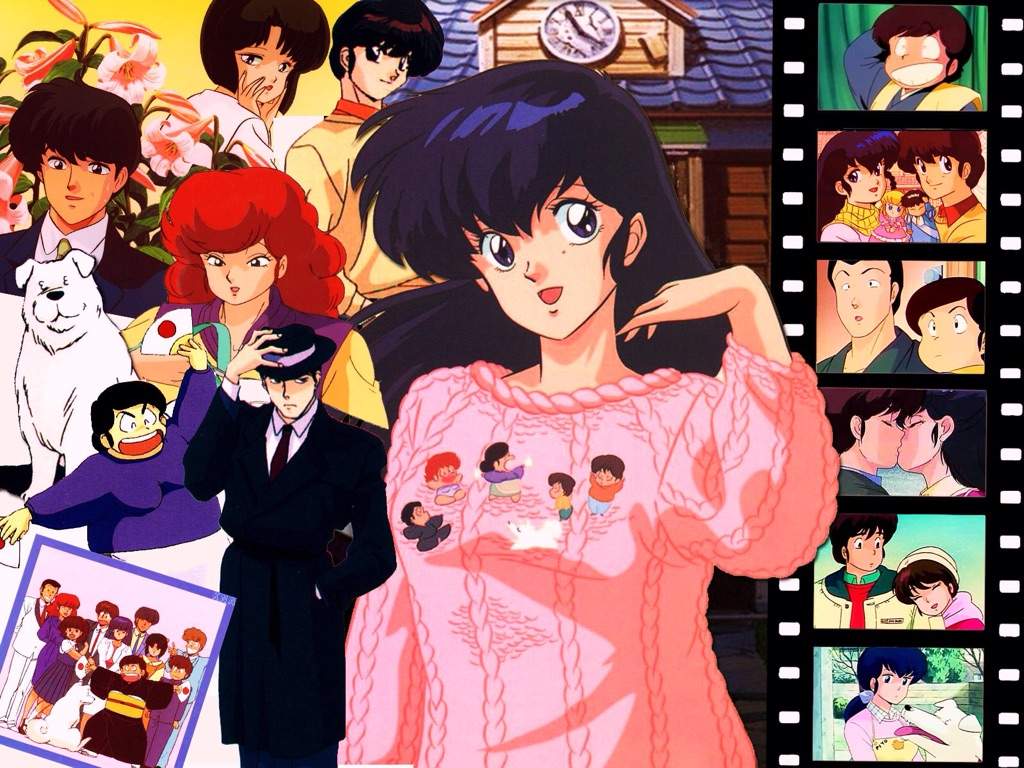
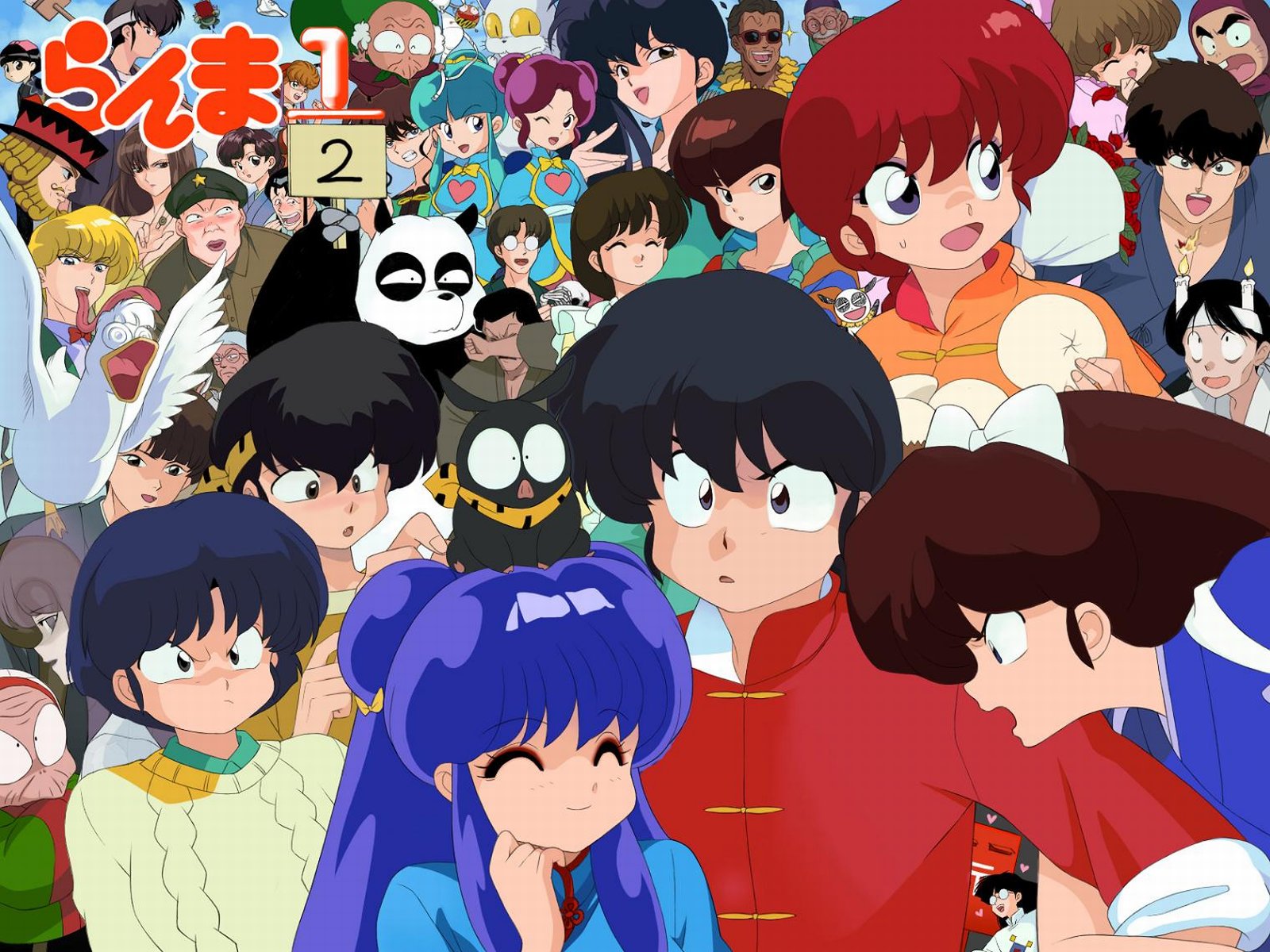

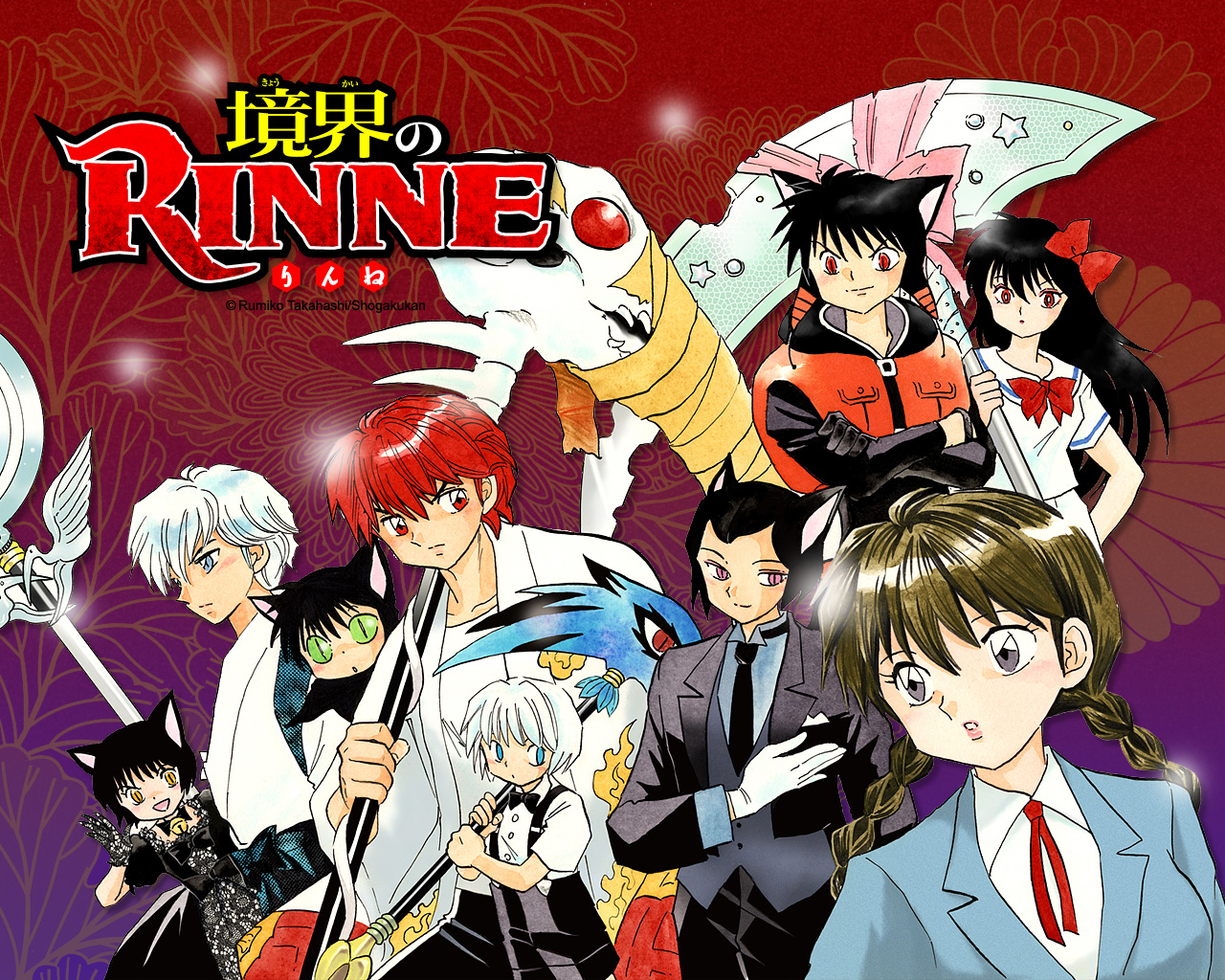
Her works include Urusei Yatsura (うる星やつら) [1978–87 with 28 million circulation in Japan], Maison Ikkoku (めぞん一刻) [1980–87 with 25 million circulation in Japan], Mermaid Saga (人魚シリーズ) [1984–94], Ranma ½ (らんま1/2) [1987–96 with 53 million circulation in Japan], One-pound Gospel (1ポンドの福音) [1987–2007], Rumic Theater (高橋留美子劇場) [1987–ongoing], InuYasha (犬夜叉) [1996–2008 with 45 million circulation in Japan] and Rin-ne (境界のRINNE) [2009–ongoing with 3 million circulation in Japan].
photo credit: Takahashi Rumiko
Mizuno Junko (水野純子, May 27, 1973-) is a Japanese manga artist. Her drawing style is often termed as Gothic kawaii or kawaii noir style. Her art has a decidedly pop-art and psychedelic flair, and a sizable proportion of her published work is colored, rather than the black and white format typical of most Japanese comics. In addition to her comics, Mizuno designs T-shirts, calendars, postcards, and other toy collectibles. In 2008, Hasbro announced a limited edition of My Little Pony based on her design for a charity auction.
photo credit: Mizuno Junko
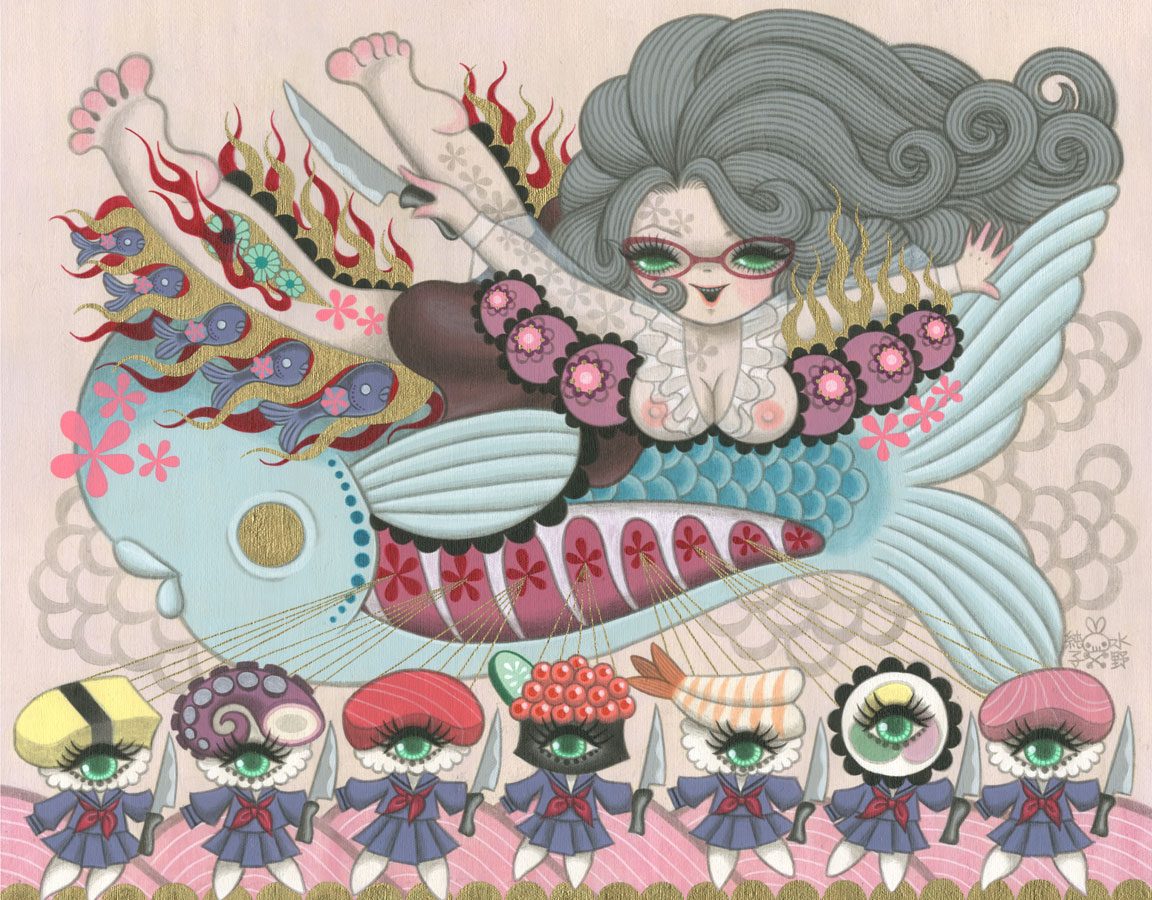
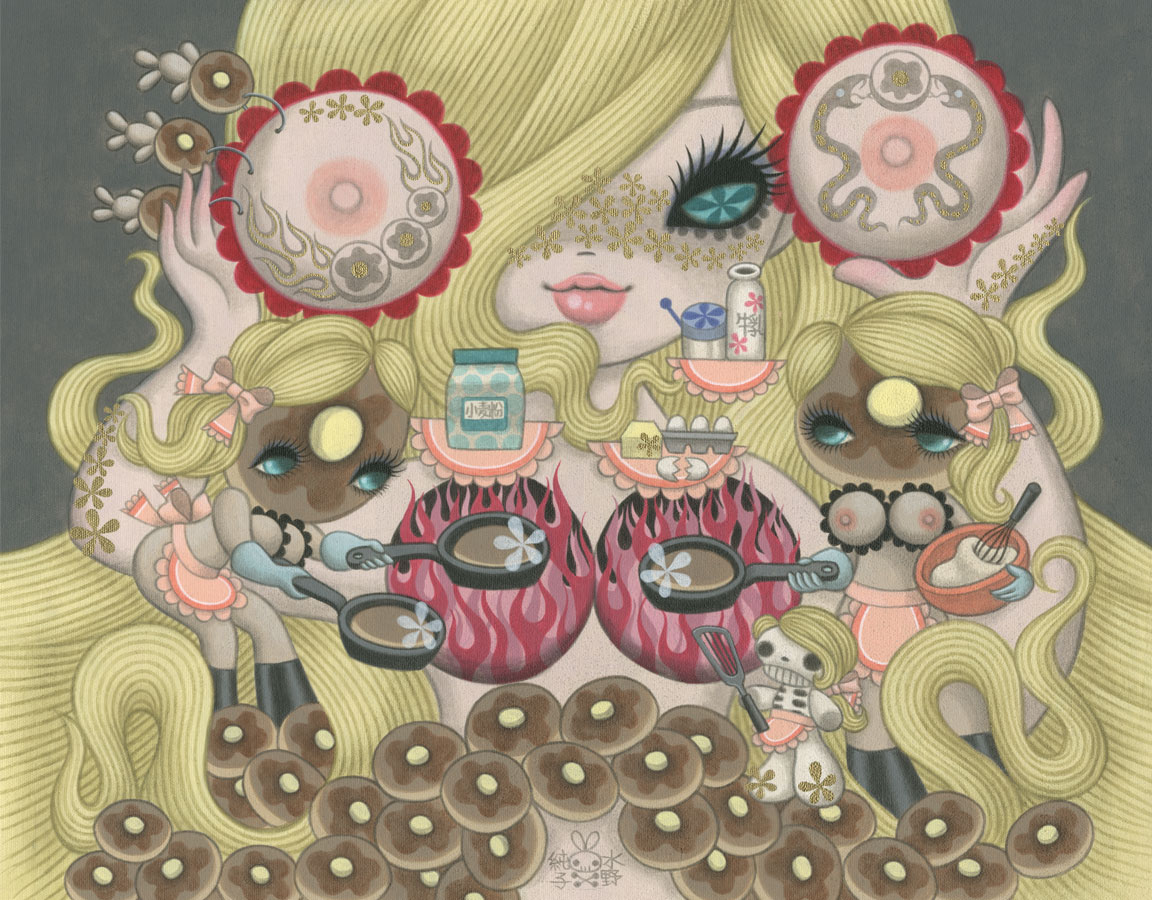

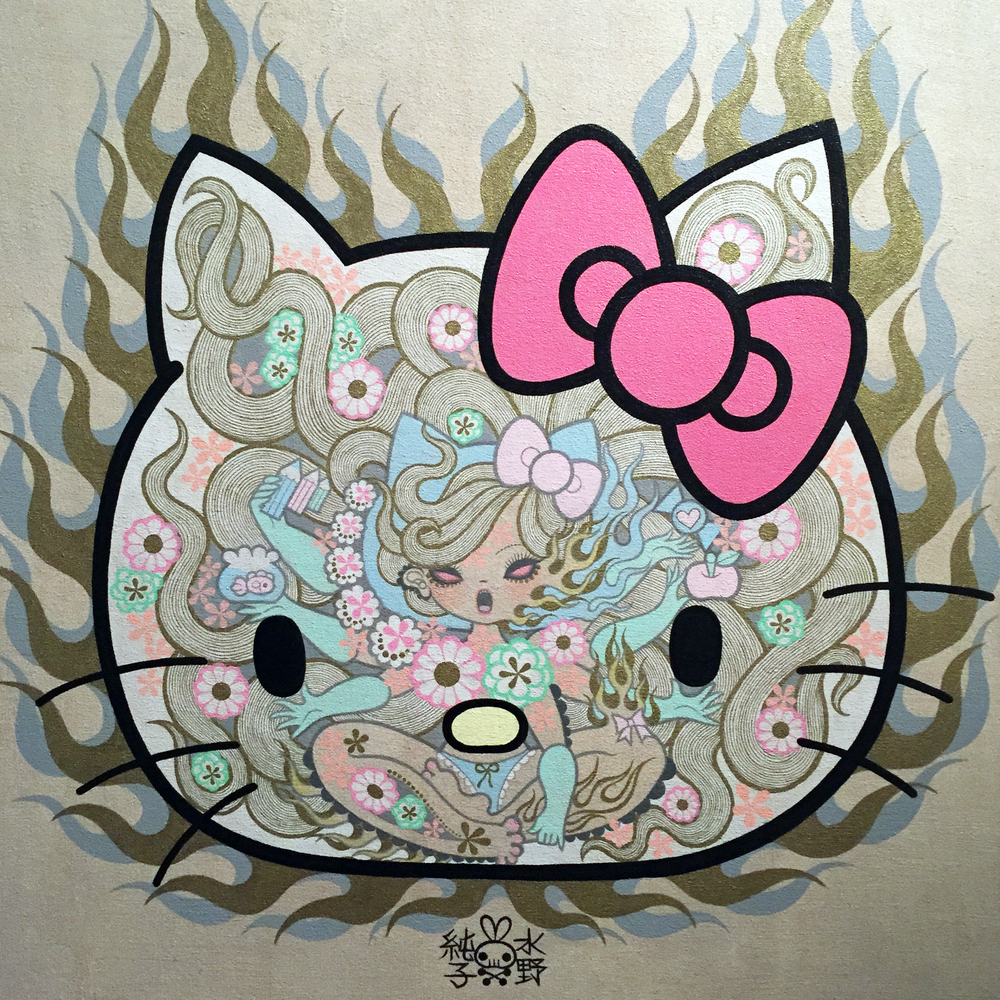
Japanese common word | expression | yojijukugo 四字熟語 | idiom | proverb
*子々孫々 | ししそんそん shishi sonson
: (yoji) one’s descendants; one’s offspring; posterity
あいの子 | あいのこ ainoko
: (derogatory term) person of mixed parentage; crossbreed; Eurasian; mulatto; hybrid OR ハーフ ha-fu
一子相伝 | いっしそうでん isshi souden
: (yoji) transmission of the secrets of an art, craft, trade or learning from father to only one child
君子豹変 | くんしひょうへん kunshi hyouhen
: (yoji) the wise readily adapt themselves to changed circumstances; the wise are quick to acknowledge their mistakes and correct them
: (in colloquial usage, ironically or as an excuse) the wise make no scruple in suddenly changing their demeanor
**才子佳人 | さいしかじん saishikajin
: (yoji) talented man and a beautiful woman; well-matched pair; wit and beauty
才子多病 | さいしたびょう saishi tabyou
: (yoji) Talented people tend to be of delicate constitution; Men of genius tend to be of delicate health; Whom the gods love die young
甘えっ子 | あまえっこ amaekko: spoilt child
聖人君子 | せいじんくんし seijin kunshi
: (yoji) person of lofty virtue; man of noble character; perfect person; saint
軽薄才子 | けいはくさいし keihaku saishi
: (yoji) shallow, glib and obsequious person
眼鏡っ子 | めがねっこ meganekko: (manga slang) girl (usu. attractive) with glasses; glasses-wearing girl
ステキ女子 | ステキじょし suteki joshi: (feminine speech) (manga slang) perfect woman; woman other women aspire to be like
君子豹変す | くんしひょうへんす kunshi hyouhensu
: A wise man changes his mind, a fool never
***師子身中蟲 shishi shinchū no mushi
: Just as no animal eats a dead lion, but it is destroyed by worms produced within itself, so no outside force can destroy Buddhism, only evil monks within it can destroy it.
馬子にも衣裳 | まごにもいしょう mago ni moishou
: anybody can look good with the right clothes; clothes make the man; fine feathers make fine birds; clothes on a packhorse driver
お茶の子さいさい | おちゃのこさいさい ocha no kosaisai
: It’s a piece of cake; It’s a simple task; It’s a cinch
可愛い子には旅をさせよ | かわいいこにはたびをさせよ kawaii ko ni wa tabi o saseyo
: (proverb) Spare the rod and spoil the child; If you love your children, send them out into the world
子は三界の首枷 | こはさんがいのくびかせ ko wa sangai no kubikase
: A child is an everlasting responsibility to parents
子を持って知る親の恩 | こをもってしるおやのおん ko o motte shiru oya no on
: (proverb) He that has no child knows not what love is
子を見ること親に如かず | こをみることおやにしかず ko o miru koto oya ni shikazu
:(proverb) The parent is the best judge of the child
子供の喧嘩に親が出る | こどものけんかにおやがでる kodomo no kenka ni oya gaderu
:(proverb) when kids get in a fight, their parents come to their aid; yelping curs will raise mastiffs
寝た子を起こす | ねたこをおこす neta ko o okosu
: to disturb the water; to wake a sleeping dog; to wake a sleeping child
君子危うきに近寄らず | くんしあやうきにちかよらず kunshi ayauki ni chika yorazu
: A wise man keeps away from danger
壁に耳あり障子に目あり | かべにみみありしょうじにめあり kabe ni mimi ari shouji ni me ari
: walls have ears; wall have ears, sliding doors have eyes
大人は赤子の心を失わず | たいじんはせきしのこころをうしなわず taijin wa sekishi no kokoro o ushinawazu
: (proverb) great human beings never lose the innocence of childhood; a virtuous ruler never loses the spirit of the common people
板子一枚下は地獄 | いたごいちまいしたはじごく itago ichimai shita wa jigoku
: (proverb) there is only the thickness of the boat’s planking between one and perdition; on a boat, one is only an inch or two from a watery grave
此の親にして此の子有り | このおやにしてこのこあり ko no oya ni shite ko no ko ari
: (proverb) the apple doesn’t fall far from the tree; like father, like son
死んだ子の年を数える | しんだこのとしをかぞえる shinda ko no toshi o kazoeru
: (proverb) crying over spilt milk; counting the age of one’s dead child
泣く子と地頭には勝てない | なくことじとうにはかてない naku ko to jitou ni wa katenai
: you cannot win against someone who doesn’t listen to reason (e.g. a crying child or a violent lord); you can’t fight City Hall
才子才に溺れる | さいしさいにおぼれる saishi sai ni oboreru
: A man of talent is ruined by his own talent
秋茄子は嫁に食わすな | あきなすはよめにくわすな akinasu wa yomeni kuwasuna
: don’t feed autumn eggplant to your wife (because they’re too delicious, because they’ll give her the chills, or because their lack of seeds will reduce her fertility)
瓜の蔓に茄子は生らぬ | うりのつるになすびはならぬ uri no tsuru ni nasubi wa naranu
: like begets like
盗人を捕らえて見れば我が子也 | ぬすびとをとらえてみればわがこなり
nusubito o toraete mireba wa ga konari
: The thief caught turn out to be one’s own son
親に似ぬ子は鬼子 | おやににぬこはおにご oya ni ninuko wa onigo
: He is unworthy of his father
親の心子知らず | おやのこころこしらず oya no kokoro ko shirazu
: there is no love like a father’s; no child knows how dear he is to his parents
親の因果が子に報う | おやのいんががこにむくう oya no inga ga ko ni mukuu
: (proverb) the sins of the father shall be visited upon the son
親は無くても子は育つ | おやはなくてもこはそだつ oya wa nakutemo ko wa sodatsu
: Nature itself is a good mother
*****親見たけりゃ子を見ろ | おやみたけりゃこをみろ oya mitakerya ko o miro
: Like father, like son
赤子の手を捻る | あかごのてをひねる akago no te o hineru
OR あかごのてをねじる akago no te o nejiru
: exceptionally easy (like taking candy from a baby); as easy as twisting a baby’s hand
老いては子に従え | おいてはこにしたがえ oite wa ko ni shitagae
: Be guided by your children when you are old
****虎穴に入らずんば虎子を得ず | こけつにいらずんばこじをえず koketsu ni irazunba koji o ezu
OR
こけつにいらずんばこしをえず koketsu ni irazunba koshi o ezu
: nothing ventured, nothing gained
Chinese expression | chengyu 成語 | idiom | proverb
*子子孫孫 [子子孙孙] zi3 zi3 sun1 sun1
: one’s posterity
亂臣賊子 [乱臣贼子] luan4 chen2 zei2 zi3
: rebels and traitors; general term for scoundrel
仁人君子 ren2 ren2 jun1 zi3
: people of good will; charitable person
佳人才子 jia1 ren2 cai2 zi3
: beautiful lady, gifted scholar; pair of ideal lovers; cf With his brains and her looks…
OR
**才子佳人 cai2 zi3 jia1 ren2
: gifted scholar, beautiful lady; pair of ideal lovers; cf With his brains and her looks…
君子之交 jun1 zi3 zhi1 jiao1
: friendship between gentlemen, insipid as water
夫子自道 fu1 zi3 zi4 dao4
: appearing to be praising others while actually praising yourself; one’s criticism of others exposes one’s own faults
多子多福 duo1 zi3 duo1 fu2
: the more sons, the more happiness
妻離子散 [妻离子散] qi1 li2 zi3 san4
: a family wrenched apart
小家子氣 [小家子气] xiao3 jia1 zi5 qi4
: petty; small-minded
浪子回頭 [浪子回头] lang4 zi3 hui2 tou2
: the return of a prodigal son
望子成龍 [望子成龙] wang4 zi3 cheng2 long2
: lit. to hope one’s son becomes a dragon; fig. to long for one’ s child to succeed in life; to have great hopes for one’s offspring; to give one’s child the best education as a career investment
早生貴子 [早生贵子] zao3 sheng1 gui4 zi3
: give birth to a son soon (propitiatory compliment to the newly-weds)
猴子偷桃 hou2 zi5 tou1 tao2
: “monkey steals the peach” (martial arts), distracting an opponent with one hand and seizing his testicles with the other; (coll.) grabbing sb by the balls
瞎子摸象 xia1 zi mo1 xiang4
: the blind touches an elephant (from Nirvana sutra 大般涅槃經|大般涅盘经 da4 ban1 Nie4 pan2 jing1); fig. unable to see the big picture; to mistake the part for the whole; unable to see the wood for the trees
父慈子孝 fu4 ci2 zi3 xiao4
: benevolent father, filial son; natural love between parents and children
西子捧心 xi1 zi3 peng3 xin1
: famous beauty Xishi 西施 Xi1 shi1 is sick at heart; beautiful woman morbidly worried about her looks
畫荻教子 [画荻教子] hua4 di2 jiao4 zi3
: to write on the sand with reeds while teaching one’s son; mother’s admirable dedication to her children’s education
貓哭耗子 [猫哭耗子] mao1 ku1 hao4 zi5
: the cat weeps for the dead mouse; hypocritical pretense of condolence; crocodile tears
赤子之心 chi4 zi3 zhi1 xin1
: pure and innocent like the heart of a newborn; sincere
腦子有泡 [脑子有泡] nao3 zi you3 pao4
: soft in the head; brainless; dumb
腦子生銹 [脑子生锈] nao3 zi5 sheng1 xiu4
: lit. brains rusty; ossified thinking
腦子進水 [脑子进水] nao3 zi5 jin4 shui3
: to have lost one’s mind; crazy; soft in the head
一錘子買賣 [一锤子买卖] yi1 chui2 zi5 mai3 mai4
: lit. fly-by-night one-off business deal; fig. to act recklessly, throwing all caution to the wind
君子遠庖廚 [君子远庖厨] jun1 zi3 yuan4 pao2 chu2
: lit. a nobleman stays clear of the kitchen (from Mencius); fig. a nobleman who has seen a living animal cannot bear to see it die, hence he keeps away from the kitchen
***師子身中蟲 [师子身中虫] shi1 zi3 shen1 zhong1 chong2
: Just as no animal eats a dead lion, but it is destroyed by worms produced within itself, so no outside force can destroy Buddhism, only evil monks within it can destroy it.
知子莫若父 zhi1 zi3 mo4 ruo4 fu4
: nobody understands one’s son better than his father
牽著鼻子走 [牵着鼻子走] qian1 zhe5 bi2 zi5 zou3
: to lead by the nose
虎毒不食子 hu3 du2 bu4 shi2 zi3
: a tiger, though cruel, will not devour its cubs; even wild beasts look after their young
*****虎父無犬子 [虎父无犬子] hu3 fu4 wu2 quan3 zi3
: lit. father a lion, son cannot be a dog. With a distinguished father, the son is sure to do well. Like father, like son
大男子主義者 [大男子主义者] da4 nan2 zi3 zhu3 yi4 zhe3: male chauvinist
矮子裡拔將軍 [矮子里拔将军] ai3 zi5 li5 ba2 jiang1 jun1
: lit. choose a general from among the dwarfs; fig. choose the best person available (out of a mediocre bunch)
****不入虎穴,焉得虎子 bu4 ru4 hu3 xue2 , yan1 de2 hu3 zi3
: How do you catch the tiger cub without entering the tiger’s lair? Nothing ventured, nothing gained.
不見兔子不撒鷹 [不见兔子不撒鹰] bu4 jian4 tu4 zi5 bu4 sa1 ying1
: you don’t release the hawk until you’ve seen the hare; one doesn’t act without some incentive
一口吃不成胖子 yi1 kou3 chi1 bu4 cheng2 pang4 zi5
: (proverb) lit. you cannot get fat with only one mouthful; fig. learn to walk before you run
以子之矛,攻子之盾 yi3 zi3 zhi1 mao2 , gong1 zi3 zhi1 dun4
: lit. use sb’s spear to attack his shield (derived from Han Feizi 韓非子|韩非子); turning a weapon against its owner; fig. to attack an opponent using his own devices; hoist with his own petard
以小人之心,度君子之腹 yi3 xiao3 ren2 zhi1 xin1 , duo2 jun1 zi3 zhi1 fu4
: to gauge the heart of a gentleman with one’s own mean measure
又想當婊子又想立牌坊 [又想当婊子又想立牌坊] you4 xiang3 dang1 biao3 zi5 you4 xiang3 li4 pai2 fang1
: lit. to lead the life of a whore but still want a monument put up to one’s chastity; fig. to have bad intentions but still want a good reputation; to want to have one’s cake and eat it too
君子一言,駟馬難追 [君子一言,驷马难追] jun1 zi3 yi1 yan2 , si4 ma3 nan2 zhui1
: (proverb) a nobleman’s word is his bond
君子之交淡如水 jun1 zi3 zhi1 jiao1 dan4 ru2 shui3
: a gentleman’s friendship, insipid as water (from Zhuangzi 莊子|庄子Zhuang1 zi3)
君子坦蕩蕩,小人長戚戚 [君子坦荡荡,小人长戚戚] jun1 zi5 tan3 dang4 dang4 , xiao3 ren2 chang2 qi1 qi1
: good people are at peace with themselves, (but) there is no rest for the wicked
君子報仇,十年不晚 [君子报仇,十年不晚]/ jun1 zi5 bao4 chou2 , shi2 nian2 bu4 wan3
: lit. for a nobleman to take revenge, ten years is not too long; fig. revenge is a dish best served cold
君子動口不動手 [君子动口不动手] jun1 zi3 dong4 kou3 bu4 dong4 shou3
: a gentleman uses his mouth and not his fist
刀子嘴巴,豆腐心 dao1 zi5 zui3 ba5 , dou4 fu5 xin1
OR
刀子嘴,豆腐心 dao1 zi5 zui3 , dou4 fu5 xin1
: lit. knife mouth but heart of bean curd; sharp tongue concealing a caring heart
浪子回頭金不換 [浪子回头金不换] lang4 zi3 hui2 tou2 jin1 bu4 huan4
: a prodigal son returned home is worth more than gold
*****有其父必有其子 you3 qi2 fu4 bi4 you3 qi2 zi3
: like father, like son
挾天子以令天下 [挟天子以令天下] xie2 tian1 zi3 yi3 ling4 tian1 xia4
: hold the feudal overlord and you control the whole country
兔子不吃窩邊草 [兔子不吃窝边草] tu4 zi5 bu4 chi1 wo1 bian1 cao3
: A rabbit doesn’t eat the grass by its own burrow. One shouldn’t do anything to harm one’s neighbors.
眼裡容不得沙子 [眼里容不得沙子] yan3 li3 rong2 bu5 de2 sha1 zi5
: can’t bear having grit in one’s eye; unable to put something objectionable out of one’s mind; not prepared to turn a blind eye
眉毛鬍子一把抓 [眉毛胡子一把抓] mei2 mao5 hu2 zi5 yi1 ba3 zhua1
: careless; any-old-how, regardless of the specific task
燕子銜泥壘大窩 [燕子衔泥垒大窝 yan4 zi5 xian2 ni2 lei3 da4 wo1
: the swallow’s nest is built one beakful of mud at a time; many a little makes a mickle
老婆孩子熱炕頭 [老婆孩子热炕头] lao3 po2 hai2 zi5 re4 kang4 tou5
: wife kids and a warm bed; the simple and good life; longa est vita si plena est; la dolce vita
頭髮鬍子一把抓 [头发胡子一把抓] tou2 fa5 hu2 zi5 yi1 ba3 zhua1
: lit. hair and beard all in one stroke; fig. to handle different things by the same method; one method to solve all problems; one size fits all
酒香不怕巷子深 jiu3 xiang1 bu4 pa4 xiang4 zi5 shen1
: fragrant wine fears no dark alley; quality goods need no advertising
象形 Pictographic.
Picture of baby with outstretched arms, legs still hidden by a blanket.
“Child” radical 39
Semantic:
只 zhi1 OR zhi3: only; merely
[kun: ただ tada. on: シ shi, せき seki, ギ gi, キ ki]
Look-alike:
孑 jie2
: alone; mosquito larvae; small
:remaining, left-over; lonely
[on: ケツ ketsu]
孓 jue2
: larvae of mosquito; beautiful
予 yu3: to give | yu2: I; me
[kun: あらかじめ arakajime. on: よ yo]
Examples:
その子は母親に甘えた。
そのこはははおやにあまえた sono ko wa hahaoya ni amaeta
The child played the baby to his mother.
父父子子。
fu4fu4 zi3zi3
Let the fathers be fathers and the sons sons.
看海的日子 – Hacken Lee 李克勤
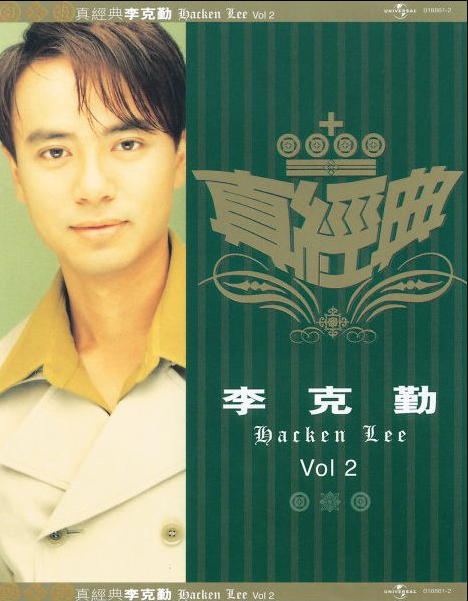
習慣於孤單中看海
冥想中少不了無奈
嘆怎麼身旁人事天天多變改
讓我的思想飄遠海
讓我的憂傷寄雲外
在某天可會尋獲心中的摯愛
我喜歡清風裡獨唱
我的心中充斥幻想
我在於感情途上放任的流浪
每顆心都驚怕受創
我的心偏一傷再傷
逝去的感情從未刻意勉強
不再有相干
未見的可有著期望
已去的不想回望
滿瀉的感情常被努力的埋藏
習慣於孤單中看海
冥想中少不了無奈
嘆怎麼身旁人事天天多變改
讓我的思想飄遠海
讓我的憂傷寄雲外
在某天可會尋獲心中的摯愛
我喜歡清風裡獨唱
我的心中充斥幻想
我在於感情途上放任的流浪
每顆心都驚怕受創
我的心偏一傷再傷
逝去的感情從未刻意勉強
不再有相干
負愛的可會獲原諒
被棄的還能跌幾趟
那天找到答案
credit: Hacken Lee 李克勤
Resources: Chinese Dictionary | Japanese Dictionary

